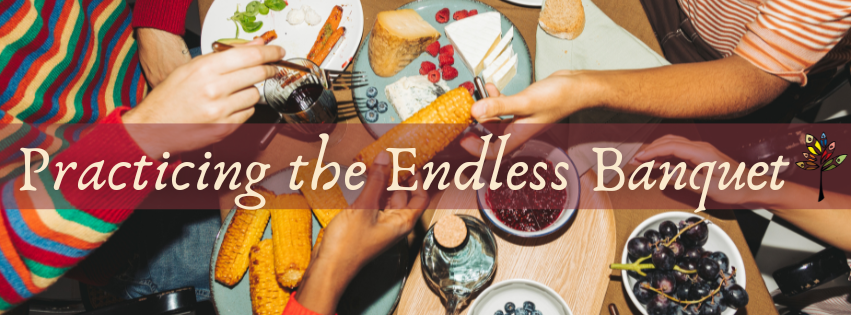
As we head into the holiday season – a time where we often gather with our loved ones around tables and share in delicious food, and one another’s company – I keep being reminded of the image of God’s endless table.
For me, the image of the eschaton being like a large banquet, with a never-ending table with enough room for all, has been an image of hope, liberation, and admittedly, also confusion. This idea that no one is separate from the love and grace of God, that our God is one who craves wholeness with us, and among each other. That in God’s desired future, we might all share in a meal together, even those we might disagree with most vehemently in this lifetime. That one day, all of creation might be reconciled to God, and that can look like gathering over a meal that never ceases, full of joy, abundance, and pleasure.
This image of a banquet table being a place of God’s salvation is a repeated metaphor throughout scripture, found in Isaiah 25:6-10, Luke 14:15-24, and Matthew 26:26-29, and so, has been a common metaphor in our practice of Holy Communion. In the Lutheran tradition, we trust that in the Eucharist, all are gathered in a mysterious union with God, to share in the sacrament with us, and that this is just a small taste of the feast that is yet to come. Every time we share in communion together, we are at the same time preparing for, and participating in, this endless table.
While thinking about this tradition, where the Kingdom of God is like gathering around a dinner table, I couldn’t help but be reminded of kitchen table polyamory. For those unfamiliar, kitchen table polyamory centers around the idea of polyamorous relationships being anchored in building community, sustaining relationships, and found family – so much so that a polycule (partners, and partners’ partners, and everyone connected in a great web of relationship!) might be so comfortable around each other, they hope to regularly gather around a kitchen table and share in a meal together. This style of polyamory is the closest definition for what my relationship structure looks like, where my partners (though not together romantically) are family to one another.
Kitchen table polyamory is itself a metaphor for the style of relationship the practitioners of it want to achieve – that of closeness, proximity, and interconnected relationships. It is especially fitting then that the Kingdom of God is said to look like all of us gathered together, around food, around abundance, around love and around reconciliation. In this way, kitchen table polyamory is a fitting metaphor for how the Kingdom of God might one day look. To me, this is not a flowery or utopic metaphor – polyamory, just as life in the Church, or in any relationship structure, is not all sunshine and rainbows. There can be hurt feelings, grief, miscommunications, and more – and yet, we are drawn back to the table, drawn to being reconciled to one another, created by God to be in community.
There is something beautiful too about how a seemingly small, daily act that my family (and incredibly queer polycule) regularly does – sharing a meal together around a table – might in some way, be re-enacting or foreshadowing the world to come. In her book Emergent Strategy, adrienne maree brown talks about how our imaginations can aid us in thinking of our future, and I find it fitting here. “Science fiction is simply a way to practice the future together. I suspect that is what many of you are up to, practicing futures together, practicing justice together, living into new stories. It is our right and responsibility to create a new world.” (pg.19) Through living kitchen table polyamory in the flesh, we are practicing God’s New Day together. We are practicing what it is like to meet one another across difference and difficulty, to share in nourishing our bodies, and building lasting community – in this act, we are in fact, living and creating the Kingdom of God together.
______________________
This blog post was lovingly submitted by an anonymous author and has full support of ELM’s Board of Directors. If polyamory, relationship anarchy, ethical nonmonogamy, or any other relationship structures are new and unfamiliar, we ask that you approach this topic with curiosity rather than judgment. Relationship structures outside of a monogamous paradigm are not for everyone, and that’s okay, but it is not okay to do harm to a sibling in Christ who finds it right for their relationship. Here are some further resources to check out if you are curious: The Triad Fam: a Polyamourus Christian Family or the book Polysecure by Jessica Fern.

